Horace Wright CBE MC MM
|
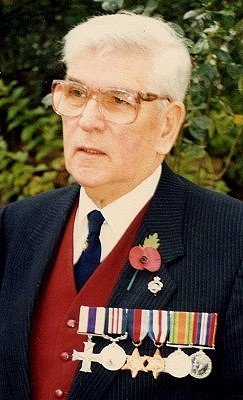 |
Horace Wright CBE, MC, MM
Funeral Address by Rev David Eaton, Vicar of Leatherhead, at St Mary's
Church, Fetcham
21 July 2000
Horace has been a considerable and formidable presence in commercial, community, military and church life, but his presence has always been dressed overall with humanity and generosity. He was in many ways a self-made man but only because he was a man of real ability and energy.
Horace was always proud of his early beginnings and where he came from was very much part of the Horace story. Although I have known him for ten years I am grateful to Alison for much of the detail of this address, especially the early period.
As we all probably know, Horace came from Liverpool, and not just Liverpool but Toxteth. This was proudly displayed on his birth certificate which he carried with him, as evidence of his pedigree. In this sense his beginnings, with his two sisters Nellie and Freda, were modest. But I suspect they were sound and you can almost see the two girls of the family doting on their brother.
An early move was to the Wirral, just across the water, but this did not sever Horace's involvement in the life of Liverpool, still in those days (1930s) a great port. He left school at thirteen and a half and became a Messenger with the Manchester Ship Canal Company, working both the Liverpool and Birkenhead Docks. He could identify the ships as they came to port by their outline alone, and greatly enjoyed the bustle of port life still then dependent on horse drawn transport.
Church was also part of Horace's life in those pre-war days and he built a reputation as a chorister, becoming champion treble for North West England. Horace never lost his love of singing and the hymns in this service very much reflect his taste. "With vigour" as the instruction for any hymn, was bread and butter to Horace when it came to hymn singing. In all this he had been encouraged by a local vicar's daughter who heard him singing, aged four, and said "Horace, you must join the choir" to which Horace responded "Please Miss I can't read". But no matter he knew all the words and credited the choir with teaching him to read as well as to sing - which isn't a bad maxim even to this day.
When war broke out Horace joined the 1st Battalion, the South Lancashire Regiment which was a bit of a fiddle, because scarlet fever had left him virtually blind in one eye. However he used the same eye twice to read the sight tests and, as everybody knows, one eye for Horace was a good as two eyes for most other men any day of the week.
Horace had a very distinguished war record of which he was rightly proud although never boastful. He landed in Normandy on D-Day - and many gentlemen there were in England then a-bed who thought themselves accursed that they did not do the same. It has become a pivotal day in recent English History. But not only did Horace land in France on that day, but he was also awarded the Military Medal for Bravery.
But it was in November 1944 near the village of Venray in Northern Holland that Horace lost his leg. He was on recognisance, and had to return with important information across a mine field. After the mine exploded he then crawled a further mile, kept going by singing a Sunday School chorus, and delivered the intelligence before allowing treatment to his wound. He was awarded the Military Cross.
It was just before the war that Horace had joined Lever Brothers as a clerk at Port Sunlight, near Liverpool. He returned in 1946 and worked his way up through office manager to eventually being a member of the Board responsible for Personnel and Development.
Although I have no details of his more than impressive working career, my feeling is that Horace stands in that tradition of British management which is fiercely loyal to the company, fights tooth and nail for the work force and is willing to take necessary risk to create development and growth. It is in many ways a fine humane tradition in a culture that has not valued as it should industrial and commercial working life, work which requires you to get your hands dirty. His work with Lever Brothers was probably his finest achievement. It was from this flowed his Chairmanship of the Chemical and Allied Industries Training Board and for which he was awarded the CBE.
It was in 1942 that Horace married Jessie Thompson whom he had known since he was twelve. She was a striking person in her own right, leading the Sunday School at St. Andrew's Bebington, on the Wirral, and increasing the number on roll tenfold from thirty to three hundred. These were the kind of vital statistics that made Horace's pulse race, and later they ran a boys club together. Jessie is buried in this churchyard and by his wish Horace will be laid to rest with her today. Horace and Jessie had one son, David. Alison tells me that Jessie was nearly as many years older than Horace as Alison is younger. I'm sure this tells us a great deal about Horace, but for the life of me I can't work out what it is.
Alison and Horace met in 1978 and they were subsequently married and Michael and David Gordon became Horace's step-sons.
We extend sincere sympathies to Alison, David and Michael and David and their families on their loss today. Horace was a devoted and proud husband, father, step father and grandfather, and we know that his absence from family life will create an enormous vacuum. Alison has indicated to me his particular affection for his grandchildren and pride in Paul's association with Teignmouth Life Boat as a member of the crew.
| In retirement very
little grass grew under Horace's feet, or is it foot. He has
been a great supporter and President of The Royal British
Legion in Fetcham; Chaired The Friends of Leatherhead Parish
Church with great enthusiasm. As Chairman he very much
supported its joint church and community stance concerned
with the historic fabric of church and churchyard, and made
a distinctive contribution by establishing charitable
status. Horace's support of church life as a whole has been
outstanding. He has been both loyal and generous....
although there may have been one or two occasions when he
pointed out things which may not have been quite the way he
approved of. He was energetic in support of Hackney Friends
Anonymous for a time making weekly trips with goods from
Leatherhead to East London. We welcome friends from Hackney
today especially The Revd Gualter de Mello.
Horace was strong minded but generous hearted, on occasions obstinate, he had very definite views, but always enthusiastic and wholehearted in support of the people and causes he believed in. And he was, of course, a man of faith. As I have indicated this was nurtured from an early age at home and in church choral singing. It sustained him in the war, at a time when death must have seemed close at hand. It sustained him through major surgery and debilitating illness in later years. He had that great ability to re-group and recover, even though at times he was brought very low. Faith gave him a great love of God. He was in many ways a natural leader and evangelist in church life. He has lived out a remarkable life of fine achievement based on the firm foundation of real and genuine Christian faith. We need have no doubt about his final destiny. Like Charles Wesley God had warmed Horace's heart and it never left him. We trust him to God's safe keeping as he inherits a place in the Holy City and all things are made new in an eternal life beyond the grave. Like all of us here, I am very pleased to have known him and it is with great respect we lay him to rest today. May he rest in peace or rise in glory. |
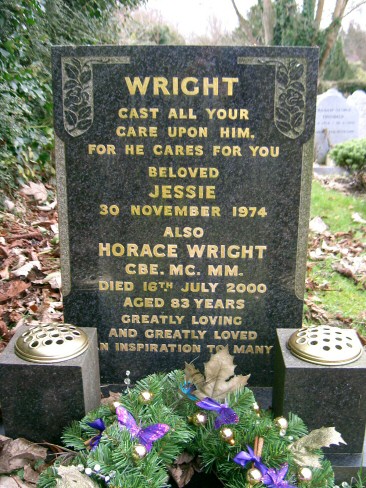 St Mary's churchyard, Fetcham, 1 Feb 2009 image: Haslam |
THE TIMES THURSDAY, AUGUST 31st,
2000
|
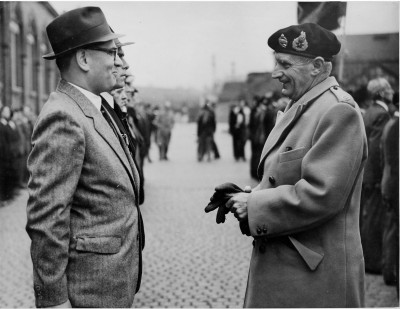 Horace Wright and Field Marshal Lord Montgomery during an inspection of former soldiers in 1947 |
His battalion, the 1st South Lancashires, with which he was then serving as a sergeant, was in the first wave of 3rd British Division to land on Sword Beach, east of Lion-sur-Mer at 0725 hours on D-Day, June 6, 1944. Their task, with the 2nd East Yorkshires who landed alongside them, was to secure the beachhead and the Periers-sur-le-Dan feature beyond it to allow the rest of the division to leapfrog forward, brigade by brigade, to capture Caen and a bridgehead over the Orne by last light on the first day.
The first two brigades achieved their objectives on time, but forward elements of the 21st Panzer Division got astride the Orne, north of Caen, to prevent capture of the divisional objective.
Caen was not finally cleared until mid-July; meanwhile the South Lancashires had to contend with the enemy's stubborn defence of their positions at Chateau de la Londe, north of Caen. An attempt to drive the enemy from this area by the South Lancashires on June 10 was unsuccessful and the battalion took serious casualties. Sergeant Wright declined his company commander's invitation to lead his platoon in a final attempt to break into the enemy's perimeter; instead he offered to make a personal reconnaissance of their positions after dark, which he did. Chateau de la Londe was finally taken by a brigade attack on June 28 and Wright was awarded the MM for his courage while leading his platoon in the battle of Normandy.
He was commissioned shortly afterwards, having been assured that this would not lead to his transfer to another battalion. In November, 1st South Lancashires were engaged with the rest of 3rd Division in widening the Nijmegen corridor, which had been driven north during September in an attempt to relieve the 1st Airborne Division at Arnhem.
In Holland on the night of November 22, Wright was making a reconnaissance of the outskirts of the village of Venraij. He found the enemy had withdrawn across some heathland, leaving a minefield, but with the position of each mine clearly indicated by newly-turned earth. He led his patrol* safely through the mines until he trod on one concealed by the stone chippings alongside a railway track. The lower part of his right leg was blown off but, after evacuation by stretcher, he was able to brief his commanding officer on the enemy's dispositions on the approach to Venraij. This incident brought an end to a series of such operations under his leadership. He was awarded the MC for his daring and successful patrol work during the advance to the Rhine.
Alfred Horace Wright was born at Toxteth, Liverpool. He left school at 13 to work as a messenger for the Manchester Ship Canal Company then, in early 1939, joined Lever Brothers at Port Sunlight and returned to them after his demoblisation.
On his retirement in 1974, he was personnel and development director for Lever Brothers, having been obliged to preside over workforce reductions as automation led to the amalgamation or closure of various plants. Wright became chairman of the Chemical and Allied Industries Training Board and was appointed CBE for his services in 1979. He resisted the abolition of training boards, arguing that they contributed substantially to the maintenance of a well-trained work force.
In spite of intermittent pain caused by the loss of his leg, Wright regarded his disablement as an asset which brought him in touch with many people whom he would otherwise never have met. In the 1980s he bought a small van to transport goods weekly from affluent Surrey, where he lived, to a charity shop in Hackney. He was much involved with the church of St Mary and St Nicholas at Leatherhead; he had a fine singing voice. As recently as May this year, he stood for a two-hour stint collecting for Christian Aid in Leatherhead High Street. His usual cheerful rejoinder to anyone who expressed sympathy at his disablement was "Those who have not suffered have not lived."
He married Jessie Thompson, a Sunday school teacher, in 1942. She died in 1974. He married Alison Gordon in 1979. She survives him together with a son of his first marriage and two stepsons.
Horace Wright, CBE, MC, MM, wartime soldier, was born on August 7, 1916. He died on July 16 aged 83.
* in fact he left his patrol at the edge of the minefield and had continued some considerable distance on his own (Alison Wright, see below)
In spite of the bouts of extreme pain, which follow violent amputation, Horace often described the loss of his leg in action as his greatest asset. It meant that for the rest of his life he no longer had to prove his worth, and it enabled him to get alongside others who were suffering. In a sermon on healing on the Sunday after his death he was described as the 'Wounded Healer'.
He landed as a sergeant on "D" Day. His battalion, 1st Battalion South Lancashire Regiment, claimed the distinction of being the first unit to brew tea on the other side of the Channel. He was always disappointed to have been held back for four hours, and proud that he did not get his feet wet when he was the first out of the landing craft.
On 10th June 1944 the battalion approached the Chateau de la Londe, and intelligence suggested that the enemy was evacuating this position. A series of platoon attacks were planned across fields of young corn, the first of which suffered heavy casualties when pinned down in the open by heavy shell, mortar and machine-gun fire. Horace refused an order to repeat the attack with his remaining men, but offered to go alone on patrol that night.
It was not until June 28th that Le Landel was eventually taken by the South Lancashires, reinforced by the 2nd Battalion the East Yorks and the 1st Battalion The Suffolks. In spite of having been told that his insubordination was an offence worthy of court martial, Horace was one of five awarded the Military Medal for his "faultless behaviour on "D" Day and the courage and efficiency shown whilst leading your Platoon during the Battle of Normandy."
His army career was characterised by frequent "returns to duty". He refused promotion to sergeant because he would not oust a long established sergeant who had been very good to him. He later refused a commission because that would mean leaving the battalion. That commission eventually came in a French cornfield, and he was allowed to stay with his own men.
After the breakout from Normandy, the Battalion moved rapidly across France and Belgium, and Horace operated ahead of the main force on reconnaissance and patrolling. By October 1944 it was engaged on strengthening and widening the "Nijmegen corridor", centred on the village of Venraij in Northern Holland. His task was to find out the enemy positions and report back. On the night of November 22nd, he found that the enemy had withdrawn across heathland beyond a railway, leaving a minefield in its wake. He picked his way through the minefield, the freshly placed mines being easily visible.
On the railway track, however, he trod on a mine hidden among the chippings, and it blew away his right leg. He made a tourniquet with his belt and crawled back nearly a mile across the minefield to rejoin his men, who brought a stretcher. All five were then blown up when one of them stepped on a mine. Horace insisted on giving his intelligence to his commanding officer before receiving attention. The History of the South Lancashire Regiment records that "Lieutenant A.H. Wright, M.M., was awarded the Military Cross for his particularly daring and successful patrol work during this phase until he was wounded in a particularly hazardous enterprise on November 22nd. "
Alfred Horace Wright, born in Toxteth, Liverpool in 1916, was very proud of his Liverpool background, and had the quick wit and ready banter which has spawned so many comedians from that city. By his retirement from Lever Bothers in 1974 he was Personnel and Development Director, and presided over drastic reductions in the work-force, as plants were amalgamated and automation took over. He was proud that no workers were ever made redundant, and that such major changes never made headlines. One of his favourite souvenirs carried the inscription "Horace, from all your friends at Domestos Factory, Newcastle", given when he closed the factory in September 1974.
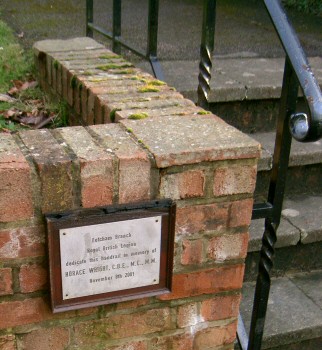 |
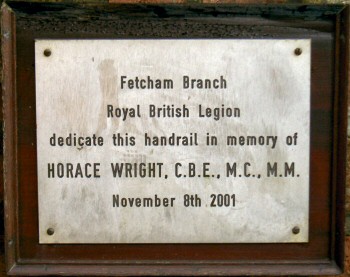 Fetcham RBL provided the handrail for the steps to the Fetcham War Memorial and dedicated them them to the memory of Horace: source Haslam |
If you have any memories of Horace please contact Frank Haslam, the editor of these pages.
last updated 4 Nov 21: unless stated otherwise images courtesy of
Alison Wright